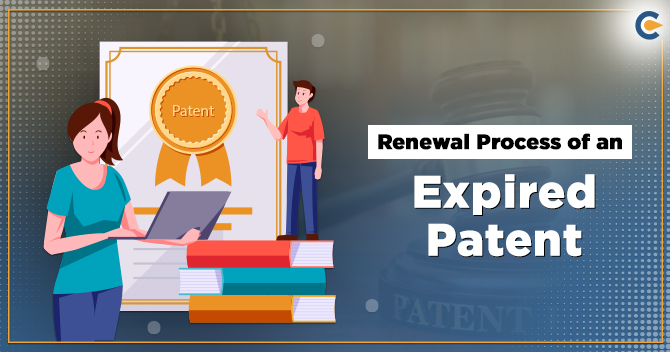When a patent is given for an invention in India, the next requisite step is to guarantee that it is renewed annually and unceasingly. Section 53 Rule 80 of the Indian Patents Act talks about the renewal process of an Expired Patent. It can be done by the payment of Patent Renewal Fees diligently during the lifetime of the patent, i.e. 20 years.
Payment and Repayment of Renewal Fees
A brief description of payment as well as repayment of renewal fees is given below-
Payment of Renewal Fees
The payment of the renewal fees needs is made to the Indian Patent Office before the end of the related year. For example, the Renewal fee for 5th year must be cleared before the expiration of 4th year from the date of the patent. The renewal fee is a obligatory due, the expiry of the 2nd year from the date of the patent and each succeeding year. The patentee can even pay an advance renewal fee for two years or more as per the Indian Patents Act[1].
Repayment of Renewal Fees
For the repayment of the renewal fee, the patentee has to cite the relevant patent number, date of the patent and the year in respect of which the renewal fee paid, to make the renewal payment request.
Additional Patent
In the case of an additional patent registration, no renewal fee needs to pay, and the fee payment schedule persists the same as of the principal patent. But in case the other patent becomes an independent patent, it shall follow the guidelines of an ordinary independent patent.
There is a provision of continuation up to 6 months if the patentee funds the directed penalty fee for the renewal. If the renewal fees not given within the extension period, the patent desists to exist and moves on the public domain.
Pending Fees
Another essential point to recollect is that if the patent is granted later than two years of the date of filing of the application; the pending fee payment has to be given within three months from the date of the patent allowance as specified in the patent register.
The summary of the whole method of patent renewal in India is that the renewal fees should be met before the commencement of each succeeding year. Nevertheless, this period is extendable by 6 months by requesting an extension of the term along with the directed penalty fees.
Read our article:Patent in India: Registration and Filing Process
Expired Patent Renewal in India – Fee Schedule
The fees schedules for Renewal of Patent are as follows-
E-filing for expired patent
The fees for an expired patent during E-filings are as follows-
| Patent Year | Individual / Small Entity Renewal Fee (INR) | Standard Renewal Fee(INR) |
| 3rd | 800 / 2000 | 4000 |
| 4th | 800 / 2000 | 4000 |
| 5th | 800 / 2000 | 4000 |
| 6th | 800 / 2000 | 4000 |
| 7th | 2400 / 6000 | 12000 |
| 8th | 2400 / 6000 | 12000 |
| 9th | 2400 / 6000 | 12000 |
| 10th | 2400 / 6000 | 12000 |
| 11th | 4800 / 12000 | 24000 |
| 12th | 4800 / 12000 | 24000 |
| 13th | 4800 / 12000 | 24000 |
| 14th | 4800 / 12000 | 24000 |
| 15th | 4800 / 12000 | 24000 |
| 16th | 8000 / 20000 | 40000 |
| 17th | 8000 / 20000 | 40000 |
| 18th | 8000 / 20000 | 40000 |
| 19th | 8000 / 20000 | 40000 |
| 20th | 8000 / 20000 | 40000 |
Physical Filing for an Expired Patent
The fees for renewal of expired patent in case of physical filing includes the above mentioned fees plus 10% are as follows- Patent Renewal Late Fee (during six months extension period)
| Mode of filing | Natural Person | Small Entity | Large entity |
| E-filing | 480/month | 1200/month | 2400/month |
| Physical filing | 528/month | 1320/month | 2640/month |
It is essential to know the significance of regular renewal fee payment; otherwise, the strategies available are expensive. Maintenance of patent renewal timelines is vital for the lifespan of the patents in India. To solve this purpose, renewal fee as per the first schedule has to ensure regularly.
Procedure to Renew an Expired Patent
The process for renewal of an expired patent is as follows-
- Restoration of an expired patent in Form-15 should be filed within 18 months from the date on which the patent expired. The patentee or the legal representative of the patentee has to fill this application form.
- The application form should consist of the circumstances under which the patentee was unable to pay the fees on time. The statement has to be supported by the reason for such delay along with the documents as evidence.
- The evidence should support the claim of the patentee that the failure of payment of fees was not intentional and there was no undue delay in applying for restoration of the patent.
- The controller of patent can call for additional evidence in case the provided evidence is not satisfactory.
- If the Controller does not agree that it is a prima facie case of restoration, the applicant should be notified. The applicant has the choice to present his reasons for restoration within one month, if the applicant does not present himself within one month the application for restoration can be refused.
- If the patentee has failed to register for change of name before expiration of the patent, they must first apply for alteration of name under Rule 94.
- If they change the name after expiration of patent, they are required to prove their identity.
- The patentee’s financial problem is not considered as a ground for failure of payment of fees, rather bankruptcy which results in physical impossibility to pay will be considered as a reasonable cause for not paying renewal fees on time.
Conclusion
Renewal of expired patent is important for the duration of a patent. A patentee should make sure that the patent is renewed on regular basis to ensure that the patent is in force. The Indian patent acts offer various way and ways to make sure the renewal and restoration of an expired patent. Feel free to contact our experts at Corpbiz for Patent registration as well as Renewal of Expired Patent.
Read our article:Procedure for Registration of Patent Agent in India











